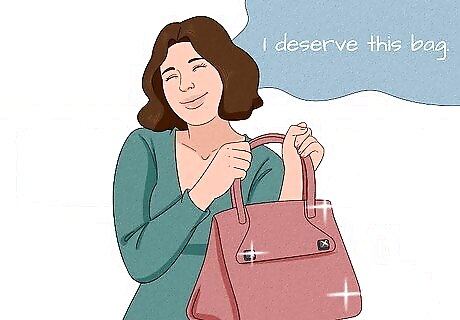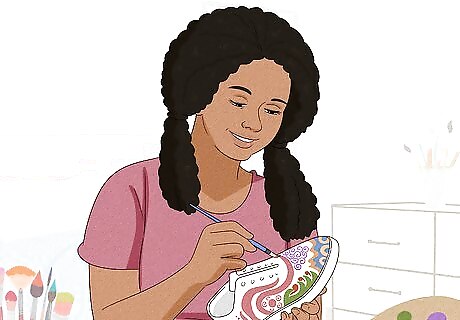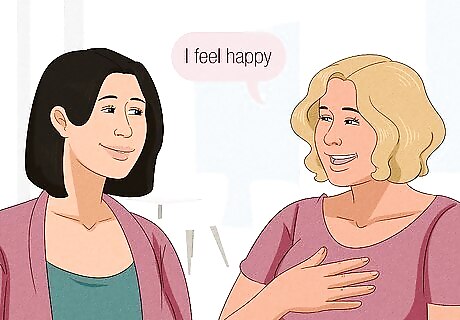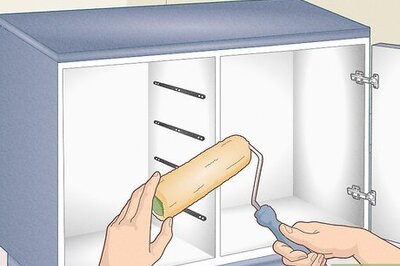
views
Expressing Happiness to Yourself

Think kind thoughts. It’s normal for humans to focus on negative aspects of ourselves. Self-critical behavior is an evolutionary trait that keeps us on the road to progression. The downside is that this behavior weighs on our ability to stay positive. In order for you to express happiness to others, you need to be able to maintain that happiness without drifting into negative thoughts, and you need to be able to express that happiness to yourself. If you’re feeling happy, let yourself feel good and do your best to steer clear of negative ideas. Be proud of your achievements and don’t let thoughts like, “I could have done that better” or “I don’t deserve this” get in your way. Congratulate, don’t flagellate.

Create art. Despite the common trope of the “tortured artist,” studies have shown that the creation of art can actually enhance happiness and prolong feelings of pleasure. During art therapy, people report that art-making is a source of joy, even when they’re creating art that may communicate a painful thought or memory. If you’re already happy, expressing that happiness through art may even enhance your already positive feelings. Paint, draw, sculpt or create something with your hands. People in art therapy often report that creating something physical is a joyful experience because they find pleasure in exploration and innovation. Some people thrive on having a tangible product in front of them. Create a gratitude journal. If you’re not much for visual art, writing your feelings can be a great way to focus on happy thoughts. You could also write a fictional story or poem and express those feelings in an abstract way, rather than just making a list of what you’re grateful for. Make music. Imaging studies of the brain show that joyful music activates reward centers in our brains and releases dopamine; this gives us a hit of happiness, much like drugs or sex would. Playing a musical instrument and creating a positive song can amp up your happiness while you’re expressing it through music.

Treat yourself well. Happy people tend to have balanced lives — which means that they know when to work and when to play. Simply taking the time to take care of yourself in whatever way you need is a great way to express your happiness and love for your mind and body. Doing nice things for yourself is the actionable equivalent of telling yourself positive affirmations in your head. If you’ve been longing for a bubble bath, but you’ve been putting it off because you’ve been so busy — schedule it for later in the day so you can get much needed relaxation. If you’re the type of person who will skip lunch while at work to finish up a spreadsheet, change it up and take an hour off to take a walk and get a sandwich.
Expressing Happiness to Others

Directly express happiness through language. Telling someone you’re in a good mood is an easy way to communicate positive feeling. Try not to brag about being happy, though — as that can come off as over-confident or even annoying. Also, try to avoid saying “You make me feel happy” instead of “I feel happy.” Even though it’s possible that the people you’re speaking to would be glad that they bring you joy, it’s also possible that they may feel pressured to respond, or they could feel responsible for continuing your happiness.

Encourage others to be the best that they can be. This may seem like it’s not a direct expression of your happiness because you’re not telling the person why you’re in a good mood. But this is a common misconception. Expressions of happiness can be abstract. Technically, you express happiness whenever your behavior is influenced by that emotion. So simply by being a positive force in someone else’s life, your happiness is shining through. Examples of encouragement include: Tell your friend how proud you are of their recent accomplishments. Give your significant other extra compliments on their singing voice when they wail to their favorite metal songs in the car. Urge your younger sibling to go for that scholarship, even when they’re discouraged.

Take part in acts of kindness. Verbal expressions of happiness are common, but sometimes actions speak louder than words. If you’re in a good mood, why not do something kind for someone else to share the wealth of positive feeling? You could make your mother a card to let her know how much you love her. You could show up at your sick friend’s house with soup and a DVD. You could donate some money to a good cause of your choice. You could give your significant more hugs than usual.

Rise above negative situations and act as a positive force in someone else’s life. When someone you know is in a bad mood, it can be easy to get swept up in their negativity. If you’re in a good mood, you’re in a place of power to transfer that positive energy to the other person and change the situation. Avoid gossip. If someone you know is saying mean things about another person, try to steer the conversation away from hurtful topics and talk about someone you love or appreciate. Leave negative environments. If you’re with someone who is cranky because they’re too hot, tired or uncomfortable, suggest that you both move to a different location to help change their mood. Be there for someone in need. If a friend is going through a rough time, do your best to listen to their thoughts and feelings and don’t be judgmental. Don’t try to force them to be in a good mood with you, but use your happiness to try to channel it into being a sympathetic ear. Giving your time to those in need is an abstract way of expressing your happiness and lending positive energy to those around you.
Evaluating Why You Struggle to Express Happiness

Ask yourself if you’re truly happy. Some would argue that this question is impossible to answer because happiness is such a subjective term. But most psychologists believe that individuals can accurately self-report their emotional states; if someone feels happy, then they probably are. However, it is possible that one could pretend to be happy to please others or get through a tough situation in life. Ask yourself if you’re truly happy, or if you’re just feigning happiness for one reason or another. If you find that you’re not as happy as you would like to be, then this may be the reason you’re struggling to communicate happiness to others.

Figure out what’s getting in the way of your expression. Each individual has his or her own unique reasons for struggling with the expression of happiness. There isn’t one be-all, end-all solution to getting through an emotional roadblock. But don’t let this discourage you! We can often answer these questions for ourselves by taking the time to think about our relationship to happiness and how this can affect our behaviors. Think about situations in your life where you succeeded at expressing happiness. Do any moments come to mind? What did you do in that situation that was notable? What parts of that moment could you reenact? Think about instances where you weren’t able to express yourself. What did you do that you would change? What thoughts were you having at the time that made it difficult for you to share your feelings? Are there any instances in your past where your happiness was stifled? Do you recall any moments where you were expected to express happiness when you weren’t happy at all?

Figure out what methods of expression feel right for you. Expressions of happiness don’t always look the same for everyone. Just because your favorite TV character expresses happiness by smiling a lot and buying his friends lunch, that doesn’t mean you have to. Every human is unique and so are their methods of expression. Test out some methods of expression to see how they feel. Buy someone flowers, treat yourself to an expensive dinner, or simply smile at a passerby. If certain expressions of happiness feel more natural than others, then go with what feels right. Do what you’re comfortable with, and then in the future you might be able to push the boundaries and try methods of expression that you normally wouldn’t. Don’t be ashamed to take baby steps.




















Comments
0 comment